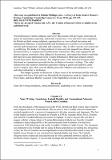| dc.contributor.author | Coolahan, Marie-Louise | |
| dc.date.accessioned | 2020-05-15T09:36:05Z | |
| dc.date.available | 2020-05-15T09:36:05Z | |
| dc.date.issued | 2018-01 | |
| dc.identifier.citation | Coolahan, Marie-Louise. (2018). Nuns Writing: Translation, Textual Mobility and Transnational Networks. In Patricia Phillippy (Ed.), A History of Early Modern Women's Writing. Cambridge: Cambridge University Press. | en_IE |
| dc.identifier.isbn | 9781107137066 | |
| dc.identifier.isbn | 9781316480267 | |
| dc.identifier.uri | http://hdl.handle.net/10379/15972 | |
| dc.description.abstract | Post-Reformation Catholic religious orders provided women with privileged, multi-layered
spaces for authorship, readership, and textual transmission. Exile and travel were imperative
for British and Irish women religious, exposing them to cross-cultural encounters and
international influences. Convent membership nurtured as co-extensive a set of identities –
national and transnational, individual and communal – that, in other contexts, were perceived
as conflicting. The kinds of writing produced in these convents ranged from obituary and
chronicle history to religious rules and devotional translations. They were required for the
female religious community; they addressed, documented, and shaped that female readership.
But these texts also participated in the Counter-Reformation effort and sustained interest
beyond their initial, female audience. The religious orders, with their pan-European reach,
functioned as transnational networks for the circulation of women’s writings. This wider
transmission and reception illuminates questions relating to gender and authorial credit –
itself a complex topic when convent identity prizes the collective and collaborative over
individual authorship or attribution.
This chapter grounds its discussion of these issues in the devotional and life writings
associated with Mary Ward and Lucy Knatchbull, the translations made by English and Irish
Poor Clares, and Susan Hawley’s account of the Sepulchrine convent at Liège. | en_IE |
| dc.description.sponsorship | Research for this chapter was funded by the European Research Council under the
European Union’s Seventh Framework Programme (FP/2007-2013 / ERC Grant Agreement
no. 615545). | en_IE |
| dc.format | application/pdf | en_IE |
| dc.language.iso | en | en_IE |
| dc.publisher | Cambridge University Press | en_IE |
| dc.relation.ispartof | A History of Early Modern Women s Writing | en |
| dc.rights | Attribution-NonCommercial-NoDerivs 3.0 Ireland | |
| dc.rights.uri | https://creativecommons.org/licenses/by-nc-nd/3.0/ie/ | |
| dc.subject | Nuns | en_IE |
| dc.subject | life writing | en_IE |
| dc.subject | translation | en_IE |
| dc.subject | textual transmission | en_IE |
| dc.subject | readership | en_IE |
| dc.subject | exile | en_IE |
| dc.subject | travel | en_IE |
| dc.subject | authorship | |
| dc.title | Nuns writing: Translation, textual mobility and transnational networks | en_IE |
| dc.type | Book chapter | en_IE |
| dc.date.updated | 2020-05-14T14:03:27Z | |
| dc.identifier.doi | 10.1017/9781316480267 | |
| dc.local.publishedsource | https://doi.org/10.1017/9781316480267 | en_IE |
| dc.description.peer-reviewed | Peer reviewed | |
| dc.contributor.funder | European Research Council | en_IE |
| dc.contributor.funder | Seventh Framework Programme | en_IE |
| dc.internal.rssid | 14140746 | |
| dc.local.contact | Marie-Louise Coolahan, Dept. Of English, Tower 1, Arts/Science Building, Nui Galway. 3787 Email: marielouise.coolahan@nuigalway.ie | |
| dc.local.copyrightchecked | Yes | |
| dc.local.version | ACCEPTED | |
| dcterms.project | info:eu-repo/grantAgreement/EC/FP7::SP2::ERC/615545/EU/The Reception and Circulation of Early Modern’s Women’s Writing, 1550-1700/RECIRC | en_IE |
| nui.item.downloads | 219 | |


